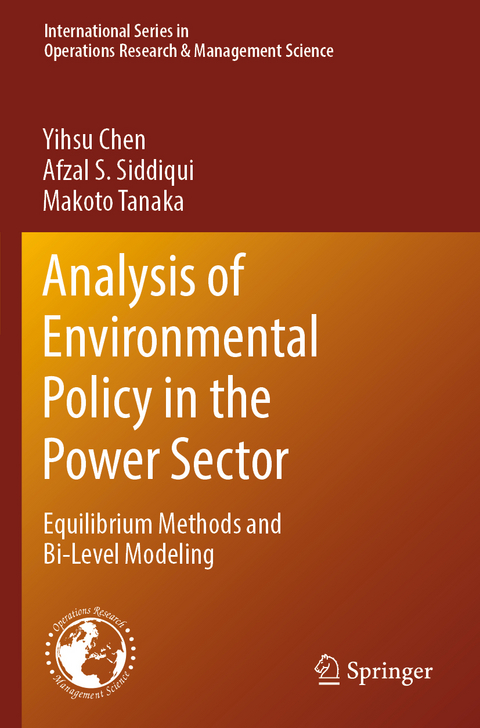
Analysis of Environmental Policy in the Power Sector
Springer International Publishing (Verlag)
978-3-030-44868-4 (ISBN)
This book includes plenty of illustrative examples to facilitate the concepts' comprehension. It is intended to make equilibrium and bi-level models adapted for policy assessment accessible to graduate students, academic researchers, industry practitioners, and policy analysts.
Yihsu Chen is Professor of Sustainability in Technology Management in the Department of Electrical and Computer Engineering at the University of California Santa Cruz. He is also affiliated with the Environmental Studies Department at the University of California Santa Cruz . Professor Chen's main research focuses on studying the impact of public policies on energy, water resources, and transportation sectors.
Afzal Siddiqui is Professor of Energy Economics in the Department of Statistical Science at University College London and a Professor in the Department of Computer and Systems Sciences at Stockholm University. His research interests are in energy economics, specifically the application of equilibrium methods for making decisions and analyzing policy in the power sector under uncertainty and competition.
Makoto Tanaka is a Professor at the National Graduate Institute for Policy Studies (GRIPS) in Tokyo, Japan. He focuses on the interdisciplinary fields of operations research and economic analysis with special interests in the energy and environmental policy issues. His research interests include analysis of oligopolistic power markets and transmission investment using approaches such as complementarity modeling and bi-level programming.
Chapter 1. Introduction.- Chapter 2. Environmental Policies in the Power Sector.- Chapter 3. Features of Power Sectors.- Chapter 4. Analysis of Power System Operations with Non-Dominant Firms.- Chapter 5. Analysis of Power System Operations with a Dominant Firm and an Oligopolistic Industry.- Chapter 6. Investment in New Power Plants under Environmental Policies.- Chapter 7. Sustainable Transmission Investment.- Chapter 8. First-Best Policy and Decentralized Mechanisms.
| Erscheinungsdatum | 28.04.2021 |
|---|---|
| Reihe/Serie | International Series in Operations Research & Management Science |
| Zusatzinfo | XIV, 270 p. 60 illus., 6 illus. in color. |
| Verlagsort | Cham |
| Sprache | englisch |
| Maße | 155 x 235 mm |
| Gewicht | 438 g |
| Themenwelt | Wirtschaft ► Allgemeines / Lexika |
| Wirtschaft ► Betriebswirtschaft / Management | |
| Schlagworte | Bi-Level Modeling • Environmental Policy • Equilibrium Methods • First-Best Policy • Game theoretic approaches • Greenhouse Gas Emissions • Market power • Mixed-Complementarity Problem • MPEC/MILP • Performance-Based Standards • Power Plants • Power sector • Power System Operations • Socially Optimal Plan • Sustainable Transmission Investment |
| ISBN-10 | 3-030-44868-1 / 3030448681 |
| ISBN-13 | 978-3-030-44868-4 / 9783030448684 |
| Zustand | Neuware |
| Informationen gemäß Produktsicherheitsverordnung (GPSR) | |
| Haben Sie eine Frage zum Produkt? |
aus dem Bereich


